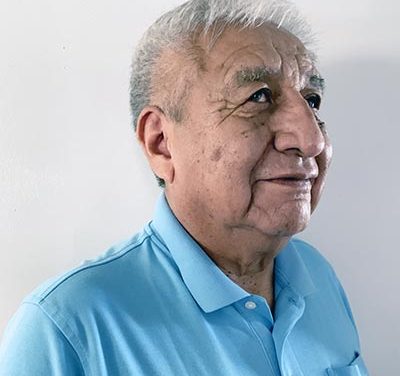Native American Heritage Month: Hoskie Benally Jr.
Happy Native American Heritage Month! As we celebrate this month, we honor the leaders, innovators, and healers who sustain and strengthen Indigenous communities. One such individual is Hoskie Benally Jr., a Diné (Navajo) spiritual leader and advocate whose work emphasizes resilience and the profound healing of cultural heritage.
Based in Shiprock, New Mexico, Hoskie’s path to becoming a powerful advocate was forged through personal adversity, ultimately leading him to help many Native American youth find their own purpose.
Hoskie was raised in the traditional ways of the Diné by his grandparents—a sheepherder and a weaver—which instilled in him a deep connection to his culture. Though his biological father, a medicine man, passed away when Hoskie was young, the healing traditions of his lineage found their way back to him unexpectedly.

At the age of 22, Hoskie was suddenly confronted with a life-altering change: he went blind within weeks due to Retinitis Pigmentosa. The shock and devastation led him into a period of deep depression and alcoholism. It was during this dark time that a medicine man offered him a profound choice—a choice that would define his future: “You have a purpose here on Mother Earth, and through this visual impairment either you can find your purpose in life and accept your visual impairment, or you may continue to fight it and let alcohol destroy you.”
Choosing purpose, Hoskie embraced his new reality. He now views his visual impairment not as a loss, but as a blessing that helped him discover his true path in life, guided by his ancestral heritage.
Hoskie’s acceptance of his “chosen path” quickly translated into meaningful action. He went on to become the Chief Executive Officer of Our Youth, Our Future, Incorporated, an intensive outpatient treatment center dedicated to Native American youth struggling with chemical dependencies.
His most significant accomplishment was transforming the program from a conventional, Western-based Alcoholics Anonymous curriculum into a bi-cultural philosophy. This model integrates Western therapeutic methods with Native American teachings, practices, and belief systems.
Hoskie recognized that healing for Native youth must start with identity. By centering their heritage and spiritual roots, the program helps young people regain self-pride in being Native American. As Hoskie explains, “Spirituality to us is a way of life. Spirituality to us says that every day is a ceremony from the time you get up to the time you go to bed.” This approach instills the cultural foundation necessary for lasting recovery and strength.
Leaders like Hoskie Benally Jr. demonstrate that by integrating cultural knowledge and traditional philosophies, they are not just treating symptoms; they are restoring a sense of self, and ensuring that every Diné individual, regardless of ability, is recognized as a vital participant in the Circle of Stories.